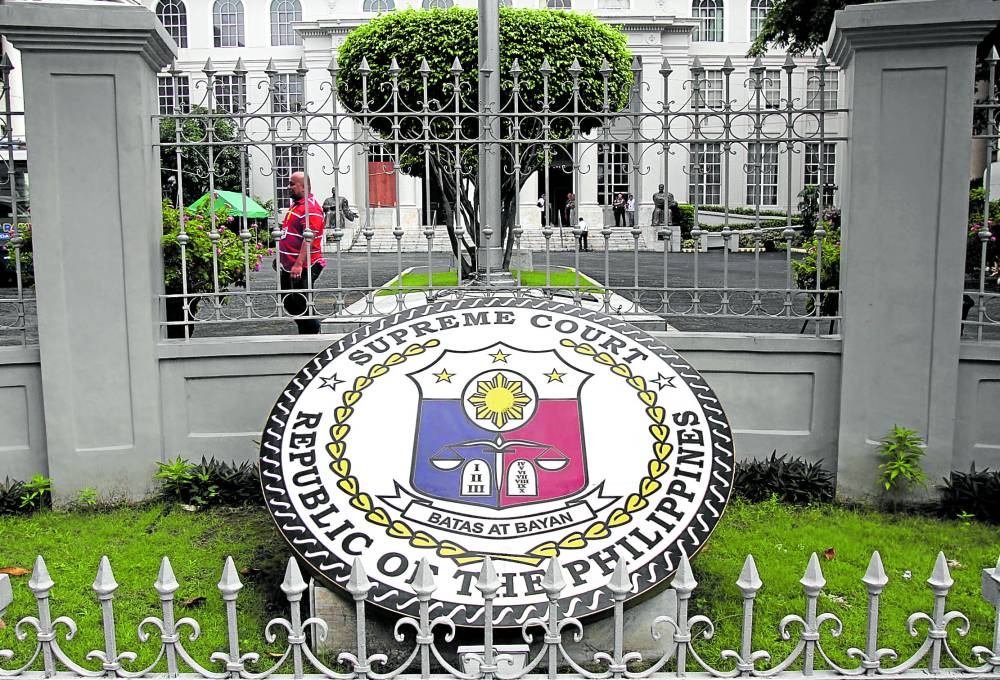
The Supreme Court Building. INQUIRER PHOTO / NIÑO JESUS ORBETA
MANILA, Philippines — The Supreme Court has fined a judge P201,000 for delaying to resolve a case for over seven years.
In a decision penned by Associate Justice Henry Jean Paul Inting, the High Court found Antipolo Regional Trial Court Branch 99 presiding Judge Miguel Asuncion of gross neglect of duty.
It upheld the Judicial Integrity Board’s (JIB) recommendation to find Asuncion guilty as he only resolved a prayer for a writ of preliminary injunction on April 11, 2023—over seven years when it was submitted for resolution on April 1, 2016.
The SC in affirming the JIB, cited Article VIII, Section 15 of the 1987 Constitution, which states that cases in lower courts must be resolved within three months from the filing of the last pleading required by the Rules of Court or by the court itself.
It also cited Canon 6, Section 5 of the New Code of Judicial Conduct which requires judges to promptly rule on pending cases.
Furthermore, the SC said that Under Rule 140 of the Rules of Court, “undue delay in rendering an order is considered neglect of duty.”
“The Court deemed Judge Asuncion’s seven-year delay in resolving the matter as inexcusable, emphasizing that a request for a writ of preliminary injunction must be treated with urgency,” the SC information office said, citing the decision.
According to the SC, the decision stemmed from a complaint for damages filed by Rolly Castillo against Princeville Construction and Development Corporation and Engineer Alfred Figueras before the Antipolo RTC Branch 99—wherein Castillo accused the corporation of forcibly evicted them from the New Cubao Central Market to take possession of the market.
Judge Asuncion conducted a hearing on the complaint on April 1, 2016 and ordered the parties to file their memoranda—the plaintiff then filed theirs on July 14, 2016 while the company did not.
The plaintiffs then attempted to re-open the hearing on July 20, 2017 amid new evidence, as well as submit the required pleadings but the motion remained unresolved. Additional motions were filed until Dec. 7, 2018 but to no avail.
It was in 2021 when the plaintiff then filed a complaint against Asuncion for gross inefficiency due to his failure to resolve their request for a writ of preliminary injunction.
Asuncion, however, cited several reasons for the delays, including the several motions filed; important matters he had to attend to; the COVID-19 pandemic; and his additional designation as Special Commercial Court and Cybercrime Court.
However, the SC ruled that while several motions were indeed filed, none of it caused any delays as each one was consistent with the earlier request for a writ of preliminary injunction “and simply urged Judge Asuncion to make a final ruling on the matter.”
The High Court also rejected Asuncion’s explanation of having other pressing matters before the COVID-19 pandemic, stating that the final pleading was submitted even before the pandemic started.
READ: NUPL calls for speedy court trial in all criminal cases
“The Court emphasized that although the pandemic posed significant challenges for the Judiciary, it cannot be used as an excuse for wrongful acts or omissions either before or during that period,” the SC information office said.
The SC also cited the constitutional right to a speedy resolution of cases.

